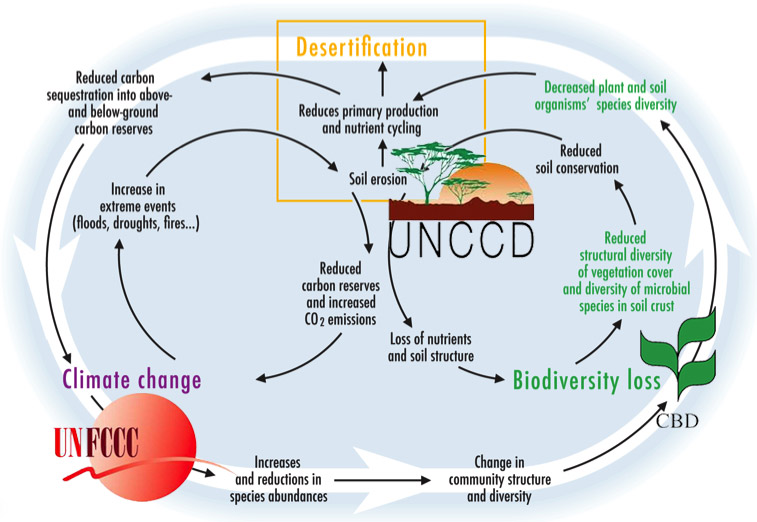|
The DESIRE project forms part of the European Union's on-going and prominent research commitment to the implementation of the UN Convention to Combat Desertification. This, itself, is part of a wider set of global initiatives all launched within a decade of the millenium.
|

|
"In the past fifteen years, the world's governments agreed on a set of goals. They agreed to protect the environment, to fight the spread of nuclear weapons, and to fight poverty. Six specific agreements stand out as crucially important. Three were signed at the 1992 Earth Summit in Rio - to fight climate change, to fight the loss of biodiversity, and to combat desertification. Two nuclear agreements came a few years later - to extend the ban on proliferation, and to ban nuclear tests. Last came the Millennium Development Goals in September 2000, to slash extreme poverty, disease, and hunger by the year 2015.
Taken together, I call these six commitments our Millennium Promises. They were undertaken in the shadow of the new Millennium, when the world yearned for meaningful commitments by our leaders."
Professor Jeffery Sachs, BBC Reith Lectures, 2007
|
 |
 |
 |
 |
 |
The three Rio Conventions are intrinsically linked, operating in the same ecosystems and addressing interdependent issues.
 |
»United Nations Framework Convention on Climate Change
The UNFCCC sets an overall framework for intergovernmental efforts to tackle the challenge posed by climate change. Its objectives are to stabilize greenhouse-gas concentrations in the atmosphere at a level that would prevent dangerous anthropogenic interference with the climate system, within a time-frame sufficient to allow ecosystems to adapt naturally to climate change; to ensure that food production is not threatened; to enable economic development to proceed in a sustainable manner. |
 |
»Convention on Biological Diversity
The objectives of the CBD are the conservation of biological diversity, the sustainable use of its components, and the fair and equitable sharing of the benefits arising from commercial and other utilization of genetic resources. The agreement covers all ecosystems, species, and genetic resources. |
 |
»United Nations Convention to Combat Desertification
The UNCCD aims to combat desertification and mitigate the effects of drought in countries experiencing serious drought and/or desertification, particularly in Africa, through effective actions at all levels, supported by international co-operation and partnership arrangements, in the framework of an integrated approach which is consistent with »Agenda 21, with a view to contributing to the achievements of sustainable development in affected areas. |
The linkages and feedback loops among the three conventions are expanded in this diagram. Since climate change and biodiversity loss can contribute to desertification, it follows that measures to minimise and adapt to climate change and loss of biodiversity also help to avoid desertification.

Source: Linkages and feedback loops among desertification, global climate change and biodiversity loss. (2009).
In »UNEP/GRID-Arendal Maps and Graphics Library. Retrieved 14:09, August 3, 2011
|



 The bigger picture
The bigger picture


